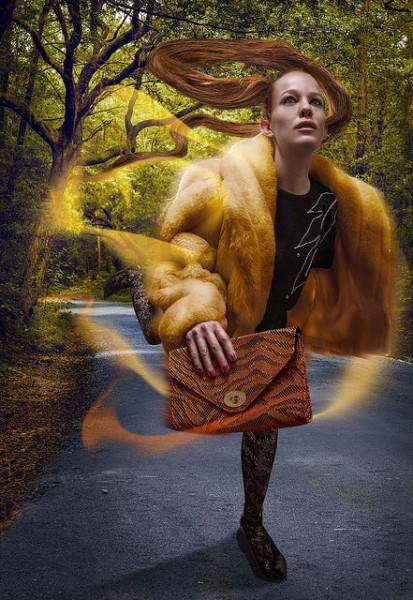The woman who works at House of Mirrors must see herself more clearly than she cares to: her image always reflected back at her from every angle, always catching herself looking at herself and herself and herself, repeated to infinity. I suppose we could take the long view and say the hallway behind her never ends, but even with this positive approach how tired she must be, endlessly eyeing herself in the corners and doorways.
In the mornings when my shop is empty I make up stories of the mirrored woman. As she stands on the street unlocking the store, she shuts her eyes briefly, in the way people will to steel themselves to do some unpleasant thing. Seeing her square her shoulders makes me think that one day she grew so tired of looking at herself she began to work with her eyes closed. She made herself memorize all the hallways, where each door began and ended, all the walls that stood around her. She counted the steps from the counter to the cash register. From the floor-length mirrors to the overheads that hang from the ceiling and sway slowly back and forth when someone opens the door.
This is rare though, for in my mind the House of Mirrors doesn’t have many customers. Those that do come in don’t stay long, because they are unnerved to see themselves multiplied so many times. They understand why the saleswoman keeps her eyes closed. I don’t even like my reflection in the window I watch her from. We are not made to bear up under such self-scrutiny. I say she lives in a big house, this woman, with no windows, and she moves from room to room trailing her hands over the things she has accumulated in her life. With her eyes closed she doesn’t know what most of them are and so she feels as if she has nothing. I tell myself she has two daughters who live far away and only call on the rare occasion when they look in the mirror and see the part of themselves that she gave them, and when she answers the phone she listens to their voices for a long time with her eyes still closed.
I do not blame the mirrored woman for any of this, nor why I can only see her in reflection. From where I work in the House of Hearts I watch a hundred of her as I move through the hearts we’ve collected here. It is my job to trim away the needless worries we carry inside us, as is it hers to hang her mirrors to catch the morning sun or the light from all our eyes. No one comes in here either, so I only speak to myself and the hearts of those who’ve gone. I wish I could talk to her. There are many things I want to say before I find my own heart among the philters here, the glass cases where I can sometimes see myself. It’s no wonder we’re all so messed up. Imagine having to live with only your own voice all the time, among the beating of a hundred thousand hearts. Or a million mirrors throwing you back at you. Every bruise and batter. Every mistake and memory.
I say it’s no wonder what she did, then. How she came to work one day with her hands full of rocks. It was not the mirrors she was after, though. Only her eyes, stuffed now with stones.

Notes from Guest Reader Justin Brouckaert
I’m enchanted by the weird, empathetic voyeurism of this story, how the author skillfully reveals the narrator’s own hopes and flaws through close observation of another. This story is strange, intimate, musical and oddly universal: the reader too easily hears his own sad voice when the narrator declares, ‘It’s no wonder we’re all so messed up.’


 The core workshop of SmokeLong Fitness is all in writing, so you can take part from anywhere at anytime. We are excited about creating a supportive, consistent and structured environment for flash writers to work on their craft in a community. We are thrilled and proud to say that our workshop participants have won, placed, or been listed in every major flash competition. Community works.
The core workshop of SmokeLong Fitness is all in writing, so you can take part from anywhere at anytime. We are excited about creating a supportive, consistent and structured environment for flash writers to work on their craft in a community. We are thrilled and proud to say that our workshop participants have won, placed, or been listed in every major flash competition. Community works.